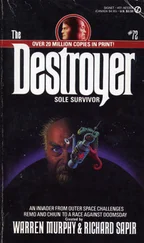The direction of his gaze masked by his sunglasses, Joe could see that the beauties’ interest in the beefcake was pretence. They were not wearing sunglasses, and while they chattered and laughed and encouraged their admirers, they glanced surreptitiously at Joe.
He walked away and did not look back.
As he took some of the beach with him in his shoes, so he strove to take the indifference of the ocean with him in his heart.
Nevertheless, he could not help but wonder what police agency could boast such astonishingly beautiful women on its force. He had known some female cops who were as lovely and sexy as any movie star, but the redhead and her friend exceeded even celluloid standards.
In the parking lot, he half expected the men in the Hawaiian shirts to be watching his Honda. If they had it staked out, their surveillance post was well concealed.
Joe drove out of the lot and turned right on Pacific Coast Highway, checking his rear-view mirror. He was not being followed.
Perhaps they had realized theft error and were frantically looking for the right man.
From Wilshire Boulevard to the San Diego Freeway, north to the Ventura Freeway and then east, he drove out of the cooling influence of the sea breezes into the furnace heat of the San Fernando Valley. In the August glare, these suburbs looked as hot and hard-baked as kiln-fired pottery.
Three hundred acres of low rolling hills and shallow vales and broad lawns comprised the memorial park, a city of the deceased, Los Angeles of the dead, divided into neighbourhoods by gracefully winding service roads. Famous actors and ordinary salesmen were buried here, rock-’n’-roll stars and reporters’ families, side by side in the intimate democracy of death.
Joe drove past two small burial services in progress: cars parked along the curb, ranks of folding chairs set up on the grass, mounds of grave earth covered with soft green tarps. At each site, the mourners sat hunched, stifled in their black dresses and black suits, oppressed by heat as well as by grief and by a sense of their own mortality.
The cemetery included a few elaborate crypts and low-walled family garden plots, but there were no granite forests of vertical monuments and headstones. Some had chosen to entomb the remains of their loved ones in niches in the walls of communal mausoleums. Others preferred the bosom of the earth, where graves were marked only with bronze plaques in flat stone tablets flush with the ground, so as not to disturb the park like setting.
Joe had put Michelle and the girls to rest on a gently rising hillside shaded by a scattering of stone pines and Indian laurels. Squirrels scampered across the grass on milder days than this, and rabbits came out at twilight. He believed that his three treasured women would have preferred this to the hard scape of a mausoleum, where there would not be the sound of wind-stirred trees on breezy evenings.
Far beyond the second of the two burial services, he parked at the curb, switched off the engine, and got out of the Honda. He stood beside the car in the hundred-degree heat, gathering his courage.
When he started up the gentle slope, he didn’t look toward their graves. If he were to see the site from a distance, the approach to it would be daunting, and he would turn back. Even after an entire year, each visit was as disturbing to him as if he had come here to view not their burial plots but their battered bodies in a morgue. Wondering how many years would pass before his pain diminished, he ascended the rise with his head down, eyes on the ground, slump-shouldered in the heat, like an old dray horse following a long-familiar route, going home.
Consequently, he didn’t see the woman at the graves until he was only ten or fifteen feet from her. Surprised, he halted.
She stood just out of the sun, in pine shadows. Her back was half to him. With a Polaroid camera, she was snapping photographs of the flush-set markers.
‘Who’re you?’ he asked.
She didn’t hear him, perhaps because he had spoken softly, perhaps because she was so intent upon her photography.
Stepping closer, he said, ‘What’re you doing?’
Startled, she turned to face him.
Petite but athletic-looking, about five feet two, she had an immediate impact far greater than her size or her appearance could explain, as though she were clothed not merely in blue jeans and a yellow cotton blouse but in some powerful magnetic field that bent the world to her. Skin the shade of milk chocolate. Huge eyes as dark as the silt at the bottom of a cup of Armenian espresso, harder to read than the portents in tea leaves, with a distinct almond shape suggesting a touch of Asian blood in the family line. Hair not Afro-kinky or in cornrows but feather-cut, thick and naturally straight and so glossy black that it almost looked blue, which seemed Asian too. Her bone structure was all out of Africa: smooth broad brow, high cheekbones, finely carved but powerful, proud but beautiful. She was maybe five years older than Joe, in her early forties, but a quality of innocence in her knowing eyes and a faint aspect of childlike vulnerability in her otherwise strong face made her seem younger than he was.
‘Who are you, what’re you doing?’ he repeated.
Lips parted as if to speak, speechless with surprise, she gazed at him as though he were an apparition. She raised one hand to his face and touched his cheek, and Joe did not flinch from her.
At first he thought he saw amazement in her eyes. The extreme tenderness of her touch caused him to look again, and he realized that what he saw was not wonderment but sadness and pity.
‘I’m not ready to talk to you yet.’ Her soft voice was musical
‘Why’re you taking pictures. why pictures of their graves?’
Clutching the camera with two hands, she said, ‘Soon. I’ll be back when it’s time. Don’t despair. You’ll see, like the others.’
An almost supernatural quality to the moment half convinced Joe that she was an apparition, that her touch had been so achingly gentle precisely because it was barely real, an ectoplasmic caress.
The woman herself, however, was too powerfully present to be a ghost or a heatstroke illusion. Diminutive but dynamic. More real than anything in the day. More real than sky and trees and August sun, than granite and bronze. She had such a compelling presence that she seemed to be coming at him though she was standing still, loomed over him though she was ten inches shorter than he. She was more brightly lighted in the pine shadows than he was in the direct glare of the sun.
‘How are you coping?’ she asked.
Disoriented, he answered only by shaking his head.
‘Not well,’ she whispered.
Joe looked past her, down at the granite and bronze markers. As if from very far away, he heard himself say, ‘Lost forever,’ speaking as much about himself as about his wife and daughters.
When he returned his attention to the woman, she was gazing past him, into the distance. As the sound of a racing engine rose, concern crinkled the corners of her eyes and creased her forehead.
Joe turned to see what was troubling her. Along the road that he had travelled, a white Ford van was approaching at a far higher speed than the posted limit.
‘Bastards,’ she said.
When Joe turned to the woman again, she was already running from him, angling across the slope toward the brow of the low hill.
‘Hey, wait,’ he said.
She didn’t pause or look back.
He started after her, but his physical condition wasn’t as good as hers. She seemed to be an experienced runner. After a few steps, Joe halted. Defeated by the suffocating heat, he wouldn’t be able to catch up with her.
Sunlight mirroring the windshield and flaring off the headlight lenses, the white van shot past Joe. It paralleled the woman as she sprinted across the grave rows.
Читать дальше












